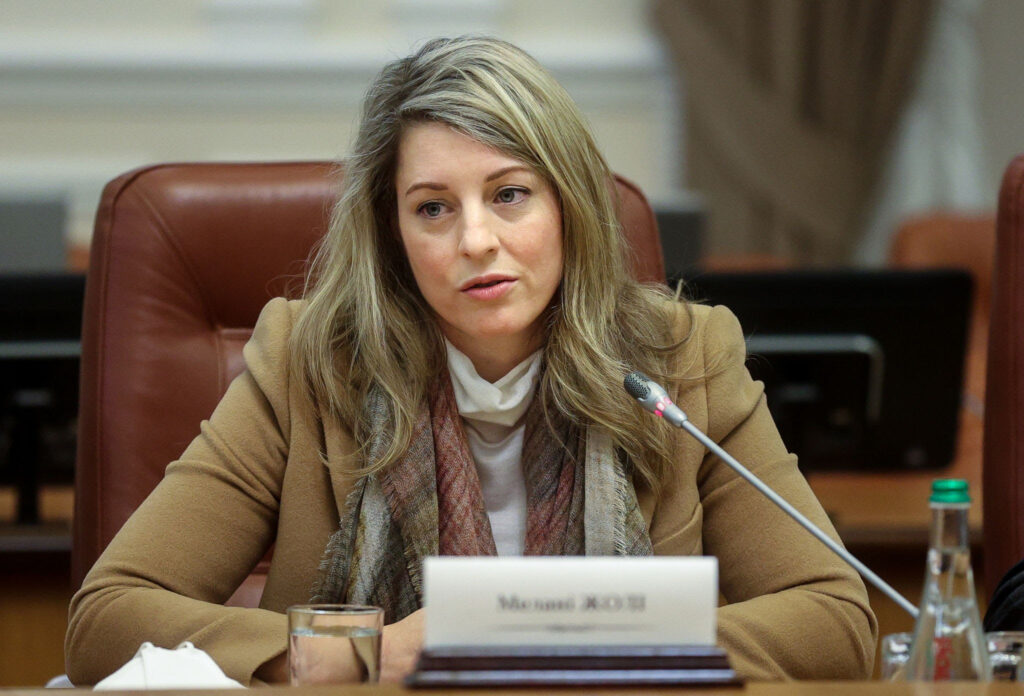The current era of global stability, built from the ruins of the Second World War, is “fracturing,” Foreign Affairs Minister Melanie Joly warned Monday. And for Canada, the stakes are high. That warning comes from remarks delivered by Joly on Canada’s place in an uncertain world at the Economic Club of Canada.
“Our world is marked by geopolitical turbulence, unpredictability and uncertainty. The tectonic plates of the world order are shifting beneath our feet,” an advance copy of Joly’s speech shared with Global News reads.
“And, the structures that are built upon them are fracturing.” Joly’s remarks come at a time when Canada is witnessing major conflicts play out on the global stage, as well as souring relations with two major nations.
Israel’s conflict with Hamas in Gaza has sparked worries of a wider conflict in the Middle East, with Iranian-backed Hezbollah regularly exchanging fire with Tel Aviv troops near the Israel-Lebanon border.
On Israel, Joly’s remarks call for a humanitarian pause in Gaza to get foreign nationals out and aid in. She said 400 Canadians are in Gaza, and believes two are being held captive by Hamas. Seven Canadians have died in the conflict.
Roughly 1,400 have died in Israel since Hamas’s deadly Oct. 7 attack, according to Israeli authorities, with the Hamas-run Gaza health ministry saying roughly 7,000 are dead there amid retaliatory Israeli airstrikes.
Meanwhile in Europe, Russia’s war against Ukraine has continued. The White House warned on Oct. 26 that Russia still has some offensive capability, and may be able to achieve some tactical gains in the coming months. Ottawa has repeatedly vowed continued support for Ukraine while emphasizing Israel’s right to self-defence in accordance with international law.
Canada’s relations with India and China – two major players on the world stage – have also reached a low point.
A diplomatic row with India has deepened after Prime Minister Justin Trudeau in September publicly said the country had “credible evidence” that agents of the Indian government may have been involved in the summertime killing of Hardeep Singh Nijjar, a Canadian Sikh leader.
India strongly denied those allegations. The two countries expelled diplomats, and Canada had to reduce the size of its presence in the country after India threatened to revoke diplomatic immunity from 41 diplomats and their families. New Delhi temporarily paused visa services in Canada, only to reinstate them last week. Furthermore, relations with China have been low since the imprisonment of the “two Michaels” in 2018 shortly after the RCMP’s arrest of Huawei CFO Meng Wanzhou on an extradition order to the U.S. They were released in 2021 after the U.S. dropped its request against Wanzhou.
Tensions only worsened late last year when Global News, along with The Globe and Mail, began reporting on allegations of Chinese foreign interference in Canadian elections and society. Beijing has strongly denied those allegations, and Ottawa has set up a public inquiry to probe them.
“The stability that has safeguarded us all is now being challenged by those who seek to change the rules of the game, undermined by those who believe they can break them without consequence,” Joly’s speech reads.
“Ahead of us lies a complex, generational challenge. One that will shape the world we leave to our children and grandchildren. They will judge us based on the steps we take next.… This is a test we cannot fail.”
How can Canada meet this challenge?
Joly’s speech outlines two principles to guide Canada’s foreign policy approach: defending sovereignty to ensure its resilience to global threats, and using pragmatic diplomacy to engage countries of different perspectives to prevent international conflict.
Source: Global News


